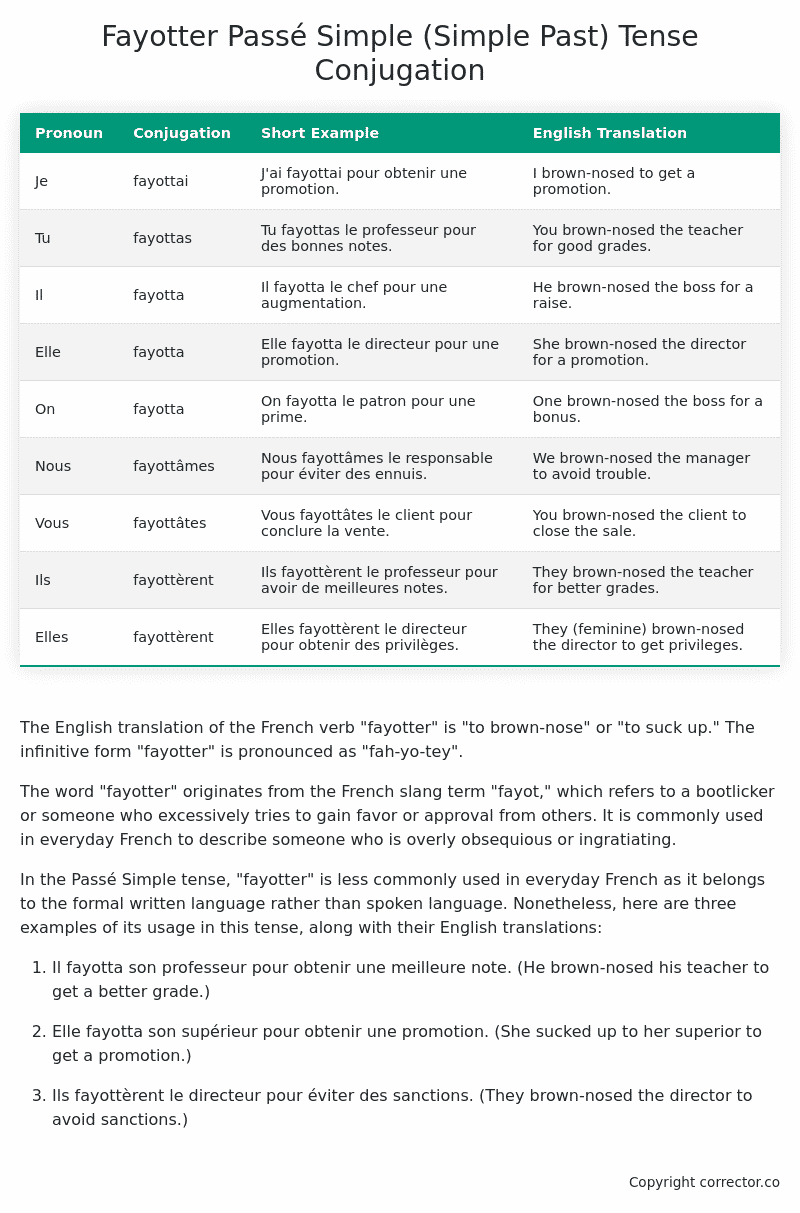Passé Simple (Simple Past) Tense Conjugation of the French Verb fayotter
Introduction to the verb fayotter
The English translation of the French verb “fayotter” is “to brown-nose” or “to suck up.” The infinitive form “fayotter” is pronounced as “fah-yo-tey”.
The word “fayotter” originates from the French slang term “fayot,” which refers to a bootlicker or someone who excessively tries to gain favor or approval from others. It is commonly used in everyday French to describe someone who is overly obsequious or ingratiating.
In the Passé Simple tense, “fayotter” is less commonly used in everyday French as it belongs to the formal written language rather than spoken language. Nonetheless, here are three examples of its usage in this tense, along with their English translations:
-
Il fayotta son professeur pour obtenir une meilleure note.
(He brown-nosed his teacher to get a better grade.) -
Elle fayotta son supérieur pour obtenir une promotion.
(She sucked up to her superior to get a promotion.) -
Ils fayottèrent le directeur pour éviter des sanctions.
(They brown-nosed the director to avoid sanctions.)
Table of the Passé Simple (Simple Past) Tense Conjugation of fayotter
| Pronoun | Conjugation | Short Example | English Translation |
|---|---|---|---|
| Je | fayottai | J’ai fayottai pour obtenir une promotion. | I brown-nosed to get a promotion. |
| Tu | fayottas | Tu fayottas le professeur pour des bonnes notes. | You brown-nosed the teacher for good grades. |
| Il | fayotta | Il fayotta le chef pour une augmentation. | He brown-nosed the boss for a raise. |
| Elle | fayotta | Elle fayotta le directeur pour une promotion. | She brown-nosed the director for a promotion. |
| On | fayotta | On fayotta le patron pour une prime. | One brown-nosed the boss for a bonus. |
| Nous | fayottâmes | Nous fayottâmes le responsable pour éviter des ennuis. | We brown-nosed the manager to avoid trouble. |
| Vous | fayottâtes | Vous fayottâtes le client pour conclure la vente. | You brown-nosed the client to close the sale. |
| Ils | fayottèrent | Ils fayottèrent le professeur pour avoir de meilleures notes. | They brown-nosed the teacher for better grades. |
| Elles | fayottèrent | Elles fayottèrent le directeur pour obtenir des privilèges. | They (feminine) brown-nosed the director to get privileges. |
Other Conjugations for Fayotter.
Le Present (Present Tense) Conjugation of the French Verb fayotter
Imparfait (Imperfect) Tense Conjugation of the French Verb fayotter
Passé Simple (Simple Past) Tense Conjugation of the French Verb fayotter (You’re reading it right now!)
Passé Composé (Present Perfect) Tense Conjugation of the French Verb fayotter
Futur Simple (Simple Future) Tense Conjugation of the French Verb fayotter
Futur Proche (Near Future) Tense Conjugation of the French Verb fayotter
Plus-que-parfait (Pluperfect) Tense Conjugation of the French Verb fayotter
Passé Antérieur (Past Anterior) Tense Conjugation of the French Verb fayotter
Futur Antérieur (Future Anterior) Tense Conjugation of the French Verb fayotter
Subjonctif Présent (Subjunctive Present) Tense Conjugation of the French Verb fayotter
Subjonctif Passé (Subjunctive Past) Tense Conjugation of the French Verb fayotter
Subjonctif Imparfait (Subjunctive Imperfect) Tense Conjugation of the French Verb fayotter
Subjonctif Plus-que-parfait (Subjunctive Pluperfect) Tense Conjugation of the French Verb fayotter
Conditionnel Présent (Conditional Present) Tense Conjugation of the French Verb fayotter
Conditionnel Passé (Conditional Past) Tense Conjugation of the French Verb fayotter
Conditionnel Passé II (Conditional Past II) Tense Conjugation of the French Verb fayotter
L’impératif Présent (Imperative Present) Tense Conjugation of the French Verb fayotter
L’impératif Passé (Imperative Past) Tense Conjugation of the French Verb fayotter
L’infinitif Présent (Infinitive Present) Tense Conjugation of the French Verb fayotter
L’infinitif Passé (Infinitive Past) Tense Conjugation of the French Verb fayotter
Le Participe Présent (Present Participle) Tense Conjugation of the French Verb fayotter
Le Participe Passé (Past Participle) Tense Conjugation of the French Verb fayotter
Struggling with French verbs or the language in general? Why not use our free French Grammar Checker – no registration required!
Get a FREE Download Study Sheet of this Conjugation 🔥
Simply right click the image below, click “save image” and get your free reference for the fayotter Passé Simple tense conjugation!

Fayotter – About the French Passé Simple (Simple Past) Tense
Formation
Usage
Narration
Historical Context
Interactions with other tenses
Passé Composé
Imparfait
Conditional and Subjunctive
Summary
I hope you enjoyed this article on the verb fayotter. Still in a learning mood? Check out another TOTALLY random French verb conjugation!


